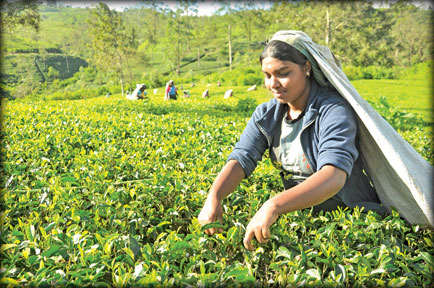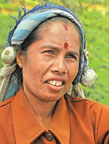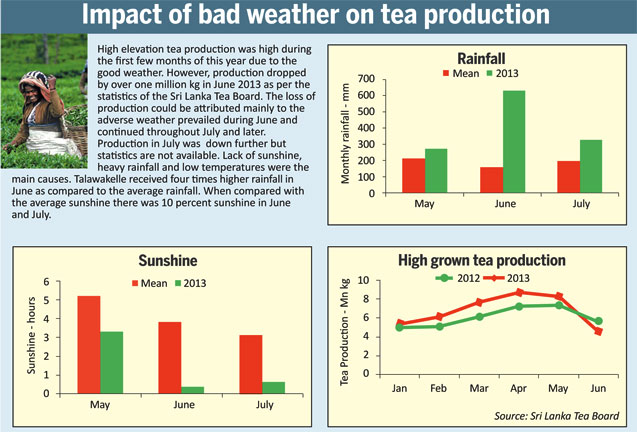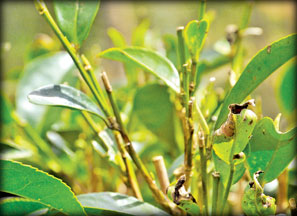|
Climate change impacts livelihoods in hill country:
Government intervention vital
By Gamini Warushamana
 Mary (32) and Chandralatha (39) pluck tea leaves in the vast tea
estate in the tea kingdom of Talawakele. Mary (32) and Chandralatha (39) pluck tea leaves in the vast tea
estate in the tea kingdom of Talawakele.
Normally this is the crop season in upcountry estates where the whole
area is covered with the yellowish green of fresh tea leaves.
But this time around it has turned into the worst period of the year,
with the lowest harvest being reported. Tea bushes were deciduous and
there were no new leaves and buds.
This is how climate change is threatening economic activity and is a
foreboding of more serious socio- economic impact in the future. On July
29 when we visited Nuwara Eliya and Talawakele, residents said that they
had just seen the sun's rays after 75 days.
During this period there was continuous rain throughout the day and
their day-to-day activities and livelihoods had been at a standstill.
They had started work again hoping the favourable weather would continue
but the situation changed again in three days and on August 1 it began
raining again and the situation took a turn for the worse.
Just a few weeks ago, the World Bank in a report warned that millions
of people around the world are likely to be pushed into poverty because
climate change is undermining economic development in poor countries.
The report said that drought, floods, heat waves, rise of sea-level
and fierce storms are likely to accompany increasing global warming and
will cause severe hardship in areas that are already poor or were
emerging from poverty.
 |
|
Chandralatha |
 |
|
Mary |
|
 |
|
Karupan |
 |
|
Dilroy Manohar |
The weather pattern we are experiencing here has confirmed those
fears within a month of the report's release. Continuous heavy rain has
affected the lives of the main economic activity of the poorest people
living in the estate sector. Poverty is the highest in the estate sector
in Sri Lanka with 11.4 poverty headcount ratio (total number of persons
living below the poverty line) compared to 9.4 in rural and 5.3 in urban
sectors.
Mary and Chandralatha are tea pluckers at the Clarendon Estate
managed by a reputed conglomerate. The estate which faces a severe
labour shortage offers work throughout the month and with overtime they
earn around Rs. 20,000 per month at a daily wage of Rs. 510.
However, due to bad weather in May, June and July they had work for
only about 15 days and without overtime their monthly income dropped to
below Rs. 5,000.
Mary with four children and being the breadwinner in her family with
no other source of income, said that living was extremely difficult.
The Assistant Manager of Clarendon Estate, Dilroy Manohar said that
in May this year tea production had dropped by 20 percent compared to
2012 and in June and July the drop was 38 and ...percent. The lowest
yield too was recorded in May, June and July this year compared to
historical data.
Tea Research Institute (TRI) officials said that low sunlight and
excess rainfall were the reasons for reduced production. Last year a
severe drought hit tea production in the area and the same issues were
faced by the industry and the workers.
Meteorologists confirmed that these were the impact of climate
change.
Director, Data, Climate Change and Astronomy of the Department of
Meteorology, A.K. Karunanayake said that up to last Tuesday the rainfall
reported this year in Nuwara Eliya area showed an increase of 538 mm.
The average annual rainfall in the area was 946.9 mm but up to now
1,484.8 mm has been reported and this is an abnormal situation, he said.
Analysts said that the impact of climatic issues of this nature was a
serious blow to tea estates that are already running at a loss. The
estate sector experiences a serious labour shortage. Manohar said that
at Clarendon Estate, the labour ratio is 1.6 whereas it should be 2.6 or
3. The sector is no longer an attractive field for the younger
generation because the work is hard and wages are low compared to the
other sectors.
The industry cannot absorb any wage increase because the cost of
production is already high. Shocks like this will worsen the situation
and hasten labour migration, he said.
 The socio-economic impact of climate change, especially on the poor,
needs to be seriously considered because the number of people on the
cusp of the poverty line is high. They immediately lose their source of
income and face severe hardship. In this case some estate companies have
given an additional 10 days wages to each worker which will be deducted
when the situation returns to normal. The socio-economic impact of climate change, especially on the poor,
needs to be seriously considered because the number of people on the
cusp of the poverty line is high. They immediately lose their source of
income and face severe hardship. In this case some estate companies have
given an additional 10 days wages to each worker which will be deducted
when the situation returns to normal.
However, it is not sufficient to maintain their lives and government
intervention is essential. Inevitably they have to tighten their belts
and cut consumption sharply while debt too has increased.
A retailer in the upper division of Desfort estate, Karupan
Mashalamudi, said that retail trade had dropped during these three
months by one-third. His debtors owe him Rs. 22,000 and he can recover
the money only after the situation returns to normal and people get work
in the estates.
Chandralatha said that in the past two months her debts increased by
Rs 10,000 and her gold jewellery worth Rs. 25,000 had been pawned to get
loans.
They have limited options in adjusting their expenditure. Reducing
consumption means cutting further the mean diet they have, which will
then lead to malnutrition.
According to Karupan, sales of medicine such as paracetamol and balm
have reduced sharply. He said that over 10 packets of Panadol are sold
every month but now it has reduced to four. This shows that people have
cut even minimum expenditure on medicine.
 Not only tea, the rubber sector too has seriously felt the impact and
tapping is limited to a few days a month. Vegetable and cut-flower
farmers in Nuwara Eliya have also fallen victim and their livelihoods
have been affected. Mashalamudi said that his carrot and leeks
cultivation in an acre of land was destroyed due to rain and the loss
was over Rs.150,000. Not only tea, the rubber sector too has seriously felt the impact and
tapping is limited to a few days a month. Vegetable and cut-flower
farmers in Nuwara Eliya have also fallen victim and their livelihoods
have been affected. Mashalamudi said that his carrot and leeks
cultivation in an acre of land was destroyed due to rain and the loss
was over Rs.150,000.
Paddy cultivation in the western slopes of the central hills and
Western and Sabaragamuwa provinces have also been affected and therefore
the impact on rural poverty too will be high. The World Bank report said
that in South Asia rain patterns will shift leaving some parts under
water and others without enough water for power generation, irrigation,
or drinking.
"In South Asia, the potential change in the regularity and impact of
the all-important monsoon could precipitate a major crisis in the
region. Events like the devastating Pakistan floods of 2010, which
affected more than 20 million people, could become common place. More
extreme drought in large parts of India could lead to widespread food
shortages and hardships," the report has warned. Therefore, we can
expect much worse situations in the future and precautions need to be
considered in advance.
|


